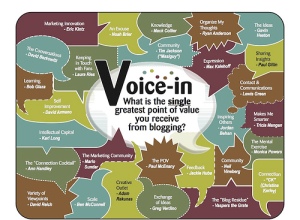The second Keynote Speaker at last week’s Edge 2010 conference was Ewan McIntosh. From the very start Ewan’s energy and passion for social media was infectious. He spoke enthusiastically about Twitter, Facebook, Bebo and running his own blog. He discussed the “illiterate professional class“, highlighting a couple of high profile news stories about users of social media being unaware of the reach of the platform that they were using and an inability to understand that when you post something online, it’s never truly private. There really is no delete button – it will always exist, somewhere, out there! Worth bearing in mind if you’re considering slagging off your boss – which is pretty much what this Facebook user did last year.
Ewan also talked about the power of the blog in today’s society. It used to be that once something appeared in print it was rarely ever challenged. I think, to to a certain extent, the system in place for challenging the journalists and national newspapers was too complex and time consuming for many of us to pursue. ..not to mention that the Press Complaints Commission is a self regulating body… Today, however, it’s much easier to correct factual inaccuracies, as Ewan pointed out when he talked about his own experience of being misrepresented in the press. He used his own blog to put into context a quote used in an article published in The Herald about GLOW – “the the world’s first national intranet for education“. In his own blog post Ewan was able to put across his own point of view, thus challenging the journalist’s interpretation of their correspondence.
This is not the first time we’ve seen social media act as a platform to correct factual inaccuracies in the press. Ben Goldacre regularly takes to his blog to challenge sensationalism and ‘bad science’ in the press. For example, he was one of the first bloggers to post about the suspicious nature of the bullying allegations against Gordon Brown.
There was so much food for thought in Ewan’s presentation…he also touched upon the pros and cons of the hyperlink; the importance of visual literacy when communicating; open data opportunities for Councils; Mapumental; and net neutrality. Just sitting there I could tell that Ewan’s presentation had stimulated lots of thoughts and ideas and at the coffee break afterwards I overheard delegates talking about how they really should be upgrading their intranets and exploring social media as a serious tool for communicating with citizens.
I hope that Ewan uploads his presentation soon so that I can post a link to it as there’s lots more that I don’t have space to cover in this blog post. All in all, an excellent keynote speech! 🙂














